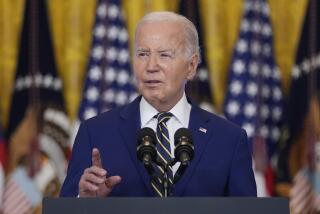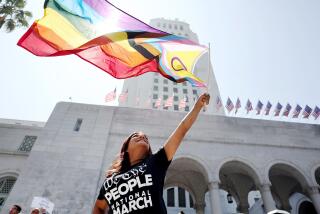Lifting Gay Military Ban Hits Emotional Chord
President-elect Bill Clinton’s insistence that the military should be open to gays and lesbians has provoked a firestorm of debate. Some examples:
“There are so many lesbian and gay people already in the military that the issue is not whether gays and lesbians should serve in the military, but whether they can do so honestly.”
--Mike Piazza, senior pastor of the 2,500-member Metropolitan Community Church in Dallas, which ministers to gay and lesbian Christians.
*
“There is no question that the homosexual community, particularly males, are very diseased. . . . If one of these men who’s known to be gay gets shot or gets hurt or starts bleeding, it’s going to be very difficult to find people who are going to rush over to take care of them.”
--Kevin Tebedo, a co-founder of Colorado for Family Values, sponsor of a drive for a law banning protective status for homosexuals.
*
“I will remember (Clinton’s announcement) for the rest of my life. For once there is a world leader who validated my life.”
--Robert F. Gentry, mayor of Laguna Beach and one of the first openly gay elected officials in California.
*
“If you have not lived in a barracks room, you really don’t know what it is like, and the problem is an increasing number of policy-makers have not lived in a barracks room, including the President-elect.”
--Commentator Robert Novak on CNN.
*
“People are frightened of what they don’t understand. You have an older generation who don’t understand homosexuality at all. You have a patriarchal system entrenched in old beliefs. . . . Our common goal is that we love the country and we’re trying to serve it. And diversity can make it richer.”
--Margarethe Cammermeyer, 26-year Army nurse, Vietnam veteran, winner of Bronze star and former chief nurse of the Washington State National Guard, discharged from Army after disclosing that she is a lesbian.
*
“Now the Army’s duty is to fight battles and win wars. Therefore, the Army must maintain morale in the ranks and use its manpower with maximum efficiency. Integration would lower morale and impair efficiency. Whites just will not serve with blacks. . . . The Army must take the country as it is. It must accept social patterns and keep abreast of changes, but it is not an instrument for social experimentation.”
--Arguments for Army segregation, cited in Cammermeyer’s lawsuit seeking reinstatement.
*
“Just as the military was able to confront the waste of racism, so too should it deal with the issue of gays and lesbians in uniformed service.”
--Seattle Times, May 31, on the Cammermeyer case.
*
“I think (Clinton) is making a grievous mistake. . . . It isn’t going to happen.”
--Gen. Donald E. P. Miller (retired), former commander of 3rd Marine Aircraft Wing at El Toro.
*
“Truman’s decision (to end segregation) strengthened the military and contributed to making America a more tolerant society. Mr. Clinton can do the same.”
--Atlanta Constitution.
*
“Apple pie, motherhood and the American flag will not fall. We’re already in the military.”
--Miriam Ben-Shalom, chairman of the Milwaukee-based Gay, Lesbian and Bisexual Veterans of America.
*
“Sniggering reports of ‘love boats’ to which male and female sailors were assigned during the Persian Gulf War, and the more recent Tailhook scandal, suggest that if the military has a problem with sexual misconduct in close quarter, gays aren’t to blame.
--Detroit Free Press.
Americans Split, Times Poll Finds
The Times Poll found Americans divided on lifting the ban on homosexuals in the military. The question: Do you approve or disapprove of allowing openly homosexual men and women to serve in the armed forces? Approve: 48% Disapprove: 44% Don’t know: 8% *
Biggest supporters Group: % approving Liberals: 63% Clinton voters: 59% College grads: 59% Northeasterners: 58% Singles: 57% Roman Catholics: 56% *
Biggest opponents Group: % opposing Bush voters: 61% Conservatives: 61% Rural residents: 56% Republicans: 56% Age 65 and over: 55% Southerners: 52% Source: Los Angeles Times Poll taken Oct. 2-5, 1992, of 1,833 adults nationwide. Margin of error is plus or minus 3 percentage points.
More to Read
Sign up for Essential California
The most important California stories and recommendations in your inbox every morning.
You may occasionally receive promotional content from the Los Angeles Times.










